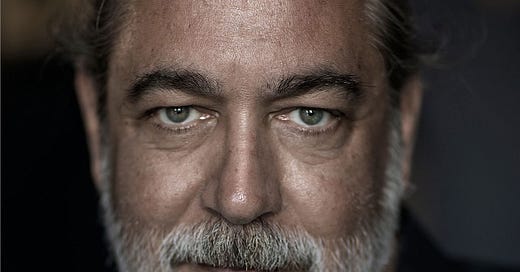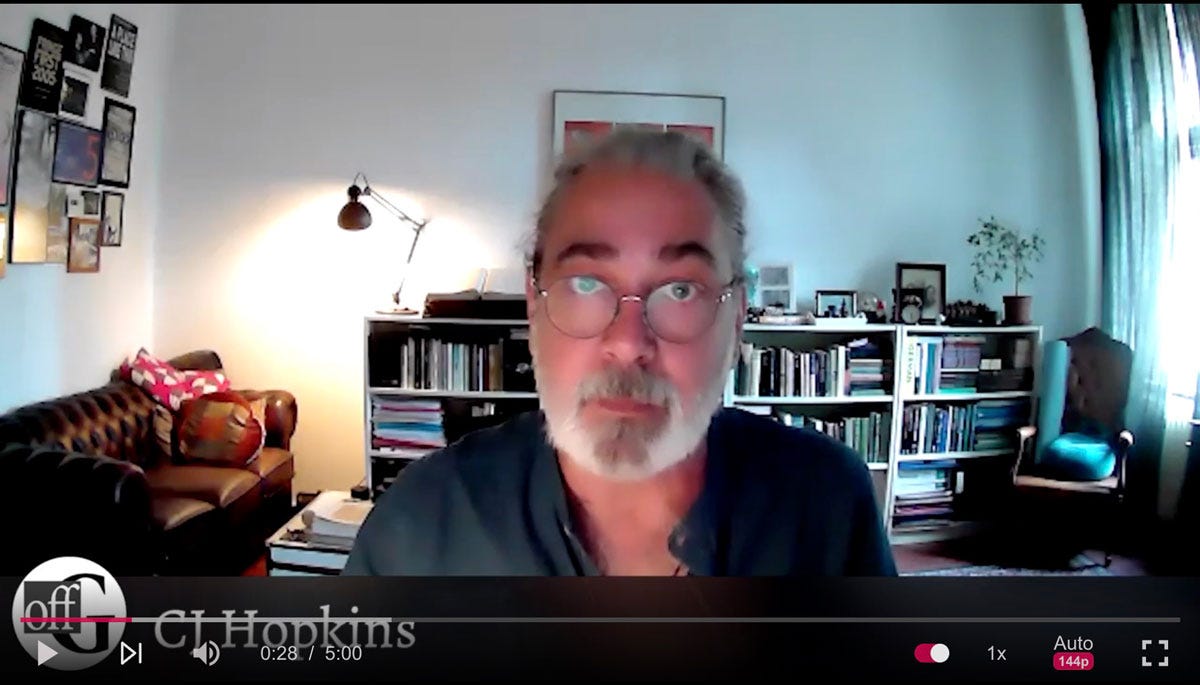Dissident Dialogues
Welcome to the inaugural edition of Dissident Dialogues! As a paid subscriber, you enjoy immediate access to this interview as it’s unfolding in real-time (“rolling” means it’s a work in progress). I will publish each new question and answer here as we progress through our conversation (likely over the course of several weeks). Once we arrive at a stopping point, I will publish a final version, which will be available to the public.
If you are a free subscriber and want to start reading this and other rolling interviews right away, now’s the time to sign up:
UPDATE: This interview has concluded, and the free version is now available to the public here:
CJ Hopkins
If you read me, you probably read CJ Hopkins, but if you are one of the rare individuals who has not yet savored CJ’s succulent satirical offerings, then head over to his Substack and sign up because his is a singular, requisite voice:
Not only is CJ my favorite satirist—living or otherwise—but he is an individual of intrepid integrity and the writer I consider closest to me in both spirit and mission. His ferocious wit and cantankerous courage make him a formidable ally in the present existential showdown with tyranny.
Veteran readers may recall I drew comparisons between CJ’s May 2021 colloquy with Planet Lockdown documentarian James Patrick and My Dinner with André in my second essay:
While I did not have the privilege of sitting down to dinner with CJ in person, I do feel like we channeled a bit of André Gregory and Wallace Shawn in the following epic exchange, which is really a conversation overlaying a meta-interview interwoven with my own meditations on his work.
An award-winning playwright, novelist, and political satirist, CJ has garnered the 2002 First of the Scotsman Fringe Firsts; Scotsman Fringe Firsts in 2002 and 2005; and 2004 Best Play of the Adelaide Fringe.
His plays have toured internationally, including at Riverside Studios (London), 59E59 Theaters (New York), Traverse Theatre (Edinburgh), Belvoir St. Theatre (Sydney), the Du Maurier World Stage Festival (Toronto), Needtheater (Los Angeles), 7 Stages (Atlanta), the Edinburgh Festival Fringe, Adelaide Fringe, Brighton Festival, and the Noorderzon Festival (the Netherlands), among others.
Described as “a feral ferris-wheel of comedy, confusion, contradiction, obfuscation and bent-out-of-shape straight talking that leaps out of the room at you and harnesses you to its mischievous mindset” (Metro) and “puts the bourbon in Beckett” (The Guardian), CJ’s first play, Horse Country, is currently enjoying a revival at the Edinburgh Assembly Festival.
He followed that up with the 2005 Scotsman Fringe First–winning screwmachine/eyecandy, an “absolutely exhilarating” (The British Theatre Guide) “blistering revelation” (Time out New York), “sharp-toothed satire” (Village Voice), and “breathtaking event” (NYTheatre.com).
“A devastatingly brilliant tour de force” that “perfectly skewers all the little lies and double-thinks which comfort us” (STV), The Extremists is “a dark satire that playfully mocks the essential absurdity of the talking-head culture … taking on big issues like the loss of individualism and the looming apocalypse” (Atlanta Journal Constitution).
As if these plays weren’t proof enough of CJ’s divinatory powers, his 2017 dystopian science fiction novel, Zone 23, makes it look like he time-traveled to 2020 to take plot notes. The perpetually-medicated “Variant-Positive” could easily be NewNormalSpeak for Delta, Omicron, and BA.5 patients. In an evident nod to scientology, the Clear generation sounds like they’ve undergone experimental gene therapy to be “corrected.” Dissidents fall into the pharmaceutically resistant Antisocials, who inhabit quarantine zones. Even the idea of dividing the citizens into classes sounds like the medical apartheid being threatened at this very moment.
Indeed, CJ’s prognostications were so dead-on, he’s not sure how to complete the trilogy now that everything he intended to write about has come to pass. The second novel, for example, was supposed to take place during lockdown.
Consent Factory Publishing—a division of the ingeniously named Consent Factory, Inc.—publishes the books of CJ’s “that no ‘respectable’ publisher would ever consider publishing,” such as his latest, The Rise of the New Normal Reich: Consent Factory Essays, Vol. III (2020–2021), and his preceding collections Trumpocalypse: Consent Factory Essays, Vol. I (2016-2017) and The War on Populism: Consent Factory Essays, Vol. II (2018–2019). See his author website for the full list of CJ’s books.
The Consent Factory About page is a virtuoso performance, leading off with:
“Consent Factory, Inc. is a market-leading provider of post-ideological consulting services to private and public sector clients throughout the developed (and in some cases developing) world. Experts in the fields of behavioral and psychological conditioning, we offer an extensive range of individually-customized strategic-planning and project-implementation services in the following areas: education (all levels); parenting; advertising and marketing; media (traditional and alternative); governance; arts and culture; spirituality; science and medicine; and many others.”
Even the Contact page is rib-tickling. Those who subscribe to his Stack or support CJ in other ways enjoy the distinction of being listed as Publishers on the masthead as well as in his books—a badge I wear proudly given that CJ was the first person I subscribed to on Substack and one of the reasons I wound up here myself. Knowing a writer of his caliber and principle had chosen this platform gave me confidence in its quality and commitment to free speech.
To paraphrase our mutual favorite novelist, Kurt Vonnegut, “the accident willed,” so now here we are together chatting, and “if this isn’t nice, I don’t know what is.”
Q&A #1
MAA: As you describe in your OffGuardian interview, you came of age during the 1960s and 1970s—a tumultuous period marked by consecutive assassinations, radical violence, extreme divisiveness, the Vietnam War, and Watergate. It’s no wonder you developed an anti-authoritarian streak and a healthy cynicism about the government. Yet there was also a budding optimism, a move toward harmony, reconciliation, and peace. When you reflect on the cultural zeitgeist and transformations of that era, how does it compare with what’s happening today?
Keep reading with a 7-day free trial
Subscribe to Margaret Anna Alice Through the Looking Glass to keep reading this post and get 7 days of free access to the full post archives.







